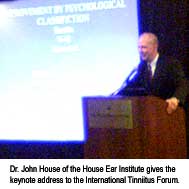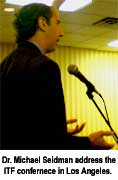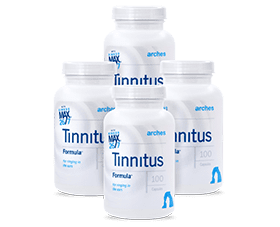Notes from the 23rd Annual Meeting of the International Tinnitus Forum
By Barry Keate
Barry Keate, has lived with tinnitus over 40 years and has published 150+ research articles on numerous aspects of tinnitus. He is an expert on the condition and a well-known advocate for those with tinnitus.
The International Tinnitus Forum (ITF) held its annual meeting September 24th at the Westin Bonaventure in Los Angeles. This year’s theme was Transitional Research in Tinnitus Therapy. The meeting provided important information on new therapies and techniques for preventing and treating tinnitus as well as further discussion on existing treatments. It was very encouraging to see how much research is being invested in the causes of and treatments for tinnitus.
The ITF is an annual meeting of eminent researchers and scientists concerned with furthering advances in the prevention and treatment of tinnitus. It is hosted by the Martha Entenmann Tinnitus Research Center and State University, New York (SUNY). The Program Chair is Abraham Shulman, MD, Professor Emeritus of Otolaryngology at SUNY and the Program Coordinator is Barbara Goldstein, PhD, the Director of Audiological Research. Michael Seidman, MD is the Co-Moderator of the Forum and the Senior Editor of the International Tinnitus Journal, which publishes papers presented at the Forum.
This article offers a brief overview of the presentations.
1 – Ben Balough, MD is the Chief of Neurotology at the Naval Medical Center San Diego. Dr. Balough’s presentation was on “Antioxidants: Their Role in tinnitus.”
Dr. Balough stated that antioxidants such as N-Acetyl Cysteine and Acetyl-L-Carnitine are very helpful in preventing hearing loss due to noise exposure or ototoxic medications. They are not helpful in treating tinnitus after it has developed.
Zinc deficiency causes tinnitus and zinc supplementation can help those who are deficient. Ginkgo biloba has been touted as a wonder drug due to the variety of neuro-protective, antioxidant and circulation enhancing properties it exhibits. Dr. Balough said that here are good indications that Ginkgo biloba can be a benefit to tinnitus patients but more studies are needed with standardized testing and large numbers of participants.
Editor’s Note: Premium quality Ginkgo biloba and chelated zinc are central ingredients in Arches Tinnitus Formula™.
There is no widely accepted, uniformly effective nutritional treatment for tinnitus. There are many clinical studies but a lack of uniformity in patient criteria and reporting is a problem. Some studies report secondary results that are results that the study did not specifically look for. Dr. Balough expressed concerns over these secondary results calling them “data mining”, or looking for positive data when the study failed to live up to the expectations of its original goal. One of the problems with secondary results is that the placebo effect is very high for tinnitus.
Dr. Balough cited that 70% of people with tinnitus have it as a result of Noise Induced Hearing Loss (NIHL). Also 200,000 veterans receive disability payments because of their tinnitus. It is the number one disability claim in the Department of Veteran Affairs. Disability claims for 2004 were $850,000,000 for tinnitus and hearing loss.
The only non-pharmacological treatment for tinnitus is Tinnitus Retraining Therapy (TRT). While this has shown success, it is expensive, very time consuming, and clinically extensive. The doctors who practice this spend enormous amounts of time with their patients and it is very difficult for them to offer treatment. Dr. Balough spoke of clinicians who offered this treatment and then had to stop because they simply didn’t have the time to practice it. It is generally offered for severe cases only.
There are no prescription drugs specifically formulated for the treatment of tinnitus. Tricyclic antidepressants, such as Amitriptyline, Nortriptyline and Amoxapine, may help reduce some of the secondary effects of tinnitus, such as stress and depression.
Baclofen, a muscle relaxer, is GABA-ergic, meaning it activates GABA (Gamma-amino-butyric acid). GABA is an inhibitory neuro-transmitter and slows electrical activity in the brain. It is known that people with tinnitus have an excess of electrical activity. If this activity can be slowed, tinnitus typically improves. This discovery led to the use of Neurontin (which also activates GABA) for the reduction of tinnitus symptoms. Neurontin was initially developed as a means of slowing epileptic seizure by increasing GABA activity. It is very effective for a small number of people with central tinnitus and Dr. Balough uses it in moderate doses, combined with Klonopin, for some of his patients. He stated that he chooses to keep the dosage small to mitigate the significant side effects of Neurontin which most often can be dizziness, somnolence, and nausea.
Quiet Times published an article about the use of Neurontin and Klonopin that can be seen by clicking here.
 2 – Claus Claussen, MD is Professor Extraordinarius of Neurotology at Wurzburg University in Germany. He is also Chairman of the International Tinnitus Forum. His work for many years has centered on whiplash injury and vertigo. He has developed equipment that can determine the extent of injury during whiplash and locate the lesions that cause vertigo and tinnitus.
2 – Claus Claussen, MD is Professor Extraordinarius of Neurotology at Wurzburg University in Germany. He is also Chairman of the International Tinnitus Forum. His work for many years has centered on whiplash injury and vertigo. He has developed equipment that can determine the extent of injury during whiplash and locate the lesions that cause vertigo and tinnitus.
During his presentation Dr. Claussen cited the famous ancient Greek healer Hippocrates, know as the “Father of Medicine.” He declared 2500 years ago that “Tinnitus is the little brother of epilepsy.” Considering the age in which Hippocrates made this comment, it is an extraordinary revelation in light of recent knowledge about tinnitus and GABA receptors.
Another fascinating comment made by Dr. Claussen was “When tinnitus is resolved, either through the application of intravenous Ginkgo biloba or electrical stimulation, brain waves normalize and vertigo resolves as well. The lesions that cause tinnitus and vertigo are in the same area of the brain.” He stated without reservation that Ginkgo biloba can resolve tinnitus.
 3 – The “Guest of Honor” speaker, John House, MD subject was “Tinnitus: 30 years of Experience and Frustration.” Dr. House is the Director of the House Ear Institute in Los Angeles. The Institute is one of the most prestigious ear clinics in the United States. He discussed some of the milestones of tinnitus therapy over the last several decades.
3 – The “Guest of Honor” speaker, John House, MD subject was “Tinnitus: 30 years of Experience and Frustration.” Dr. House is the Director of the House Ear Institute in Los Angeles. The Institute is one of the most prestigious ear clinics in the United States. He discussed some of the milestones of tinnitus therapy over the last several decades.
Cochlear implants reduce or eliminate tinnitus in most patients who receive them. This led to the development of electrical stimulation for tinnitus, for which experiments are ongoing.
His clinic did some of the first work on Biofeedback for tinnitus. Biofeedback controls anxiety, reduces muscle tightness and increases vasodilation, thereby increasing circulation. He said that sociopathic patients are not helped by it but depressed patients are. In his experience 15% can eliminate their tinnitus through biofeedback, 29% will have significant reduction and 20% will have some reduction. He attributed Murray Grossan, MD as being the first physician who suggested using Biofeedback in the treatment of tinnitus.
Editor’s note: You can read Dr. Grossan’s simple method of practicing Biofeedback at home at the end of this article.
 4 – Michael Seidman, MD is Co-Moderator of the International Tinnitus Forum and endorses the use of Arches Tinnitus Formulas for patients with tinnitus. His presentation was on “Direct Electrical Stimulation of the Auditory Cortex for the Control of Tinnitus.”
4 – Michael Seidman, MD is Co-Moderator of the International Tinnitus Forum and endorses the use of Arches Tinnitus Formulas for patients with tinnitus. His presentation was on “Direct Electrical Stimulation of the Auditory Cortex for the Control of Tinnitus.”
Dr. Seidman states that tinnitus is a result of dysynchrony (failure to synchronize) of the auditory signal due to hyperactivity of the auditory cortex. Tinnitus can be impacted anywhere along the auditory pathway. While repetitive Transcranial Magnetic Stimulation (rTMS) shows considerable promise in alleviating tinnitus in many patients, it only penetrates 1-2 cm beneath the skull. The auditory cortex is 5-10 cm down so rTMS is not able to affect it. We have published an article about rTMS that can be seen clicking here.
Dr. Seidman posits that it may be possible to implant electrode arrays directly into the auditory cortex which could be capable of effectively minimizing or even eliminating tinnitus.
5 – S. Chandrashaker, MD presented findings of a very small clinical study on sound cancellation of tinnitus. This was based on the work of Daniel Choy, MD of the Tinnitus Control Center in New York City. We wrote an earlier article on his technique, called Sound-Based Tinnitus Therapy, that can be seen by clicking here
The Tinnitus Control Center conducted this small trial consisting of 16 patients who underwent what is called a crossover study. This means that half the patients receive the active treatment and half receive placebo then they switch places so each patient takes both active and placebo treatments.
The treatment consisted of several sessions of tinnitus matching to reproduce both pitch and sound level. The patients were then played back a replica of their own tinnitus with an unusual twist: The sound changed phase by six degrees every minute for 60 minutes so it went through a 360 degree phase shift and ended up right where it started. The sound was between 100 and 180 degrees out of phase 30% of the time. During this period the test subjects’ tinnitus was cancelled by presenting out-of-phase (sound canceling) sound matching their tinnitus. Patients were given one session each week.
Of the 39 treatment sessions, 32 sessions resulted in tinnitus improvement, 2 sessions had no improvement and 5 sessions resulted in patients’ tinnitus temporarily worsening. The typical response was an initial improvement followed by a worsening for 24 hours and then much better for the rest of the week.
There will be further studies in the future. Until then the Tinnitus Control Center continues to work with patients. Those who have improvement purchase a CD of the phase shifting sound which they can use at home through any high quality sound system or a headset.
The 24th annual meeting of the ITF will be held in September, 2006 in Toronto, Ontario. Quiet Times will be in attendance to bring you the latest news from the frontlines of tinnitus medicine and research.
| Dr. Grossan’s Basic Biofeedback MethodBiofeedback is a tool used to train people to alter brain activity, heart rate, blood pressure and other bodily functions that are not normally controlled voluntarily. It can have a positive effect on tinnitus and has been recommended for many years by the American Tinnitus Association. It generally requires people to go to a biofeedback clinic where they are hooked up to sensitive monitors and trained in how to control these functions.Dr. Grossan describes a basic biofeedback treatment that can be practiced at home in a few minutes. He has noted good success in his tinnitus patients using this method.Normally, when someone tells us to relax, it doesn’t mean anything as we have nothing to compare with. Dr. Grossan tells tinnitus patients to stand in front of a mirror and watch their face relax. The reflection will show us the difference between the relaxed state and normal.Breathe in for 4 seconds and out for 6 seconds. Absolute timing is not as important as making sure the exhale is longer than the inhale. Allow your face to totally relax and your jaw to drop open. Practice this for 10 minutes twice weekly until you feel you are relaxing deeper and it is easier to do. After the initial period practice this for one minute every hour for 2-4 weeks. Your tinnitus should improve.
Dr. Grossan claims it is beneficial for TMJ patients also. People with TMJ open their jaw sideways. He instructs to draw a line up and down on the mirror. As your jaw relaxes and opens, make sure it falls in a straight line. |
Get Free Shipping!
Order now and get free shipping on either the Tinnitus Starter Kit or Combo Pack. Try the doctor recommended products with clinically proven ingredients for tinnitus. No coupon code required.

